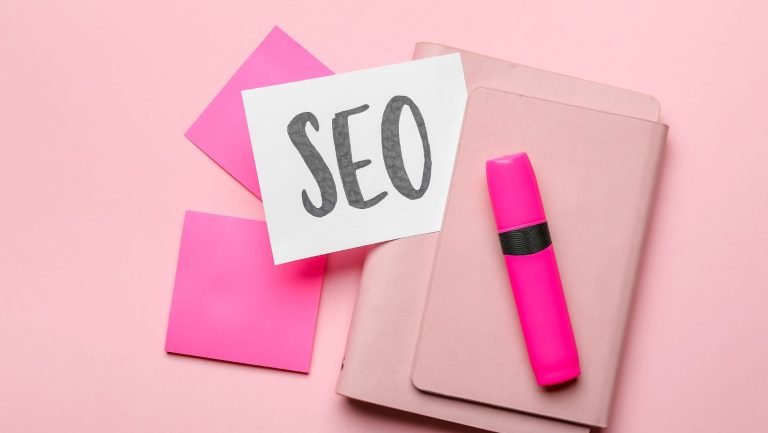The 4 Types Of SEO: What You Need To Know
Note: This post may contain affiliate links; I may earn a commission (at no extra cost to you) if you make a purchase via my links. See my disclosure for more info.

If you’re running a business and have a website, you’ve probably heard the term SEO. It’s essential because it helps your website appear when people search for things you sell online. We’re talking about getting found on search engines like Google, Bing and Yahoo.
SEO is the magic that drives organic traffic to your website. But did you know that SEO is not a one size fits all game, there are actually 4 types of SEO? I’ll explain what the 4 types of SEO are and how they can help your website rank better on search engine results pages.
Table of Contents
What Are The 4 Types Of SEO?
Okay, so the four types of SEO are On-Page, Off-Page, Technical, and Local. Each one has its own set of best practices and strategies to help boost your website’s ranking on search engine results pages (SERPs). We’ll go into each of these types in more detail later on, but for now, here’s a quick overview:
| Type of SEO | What It Does | Why It’s Important |
|---|---|---|
| On-Page SEO | Focuses on content and keywords on your website | Helps search engines understand your site better |
| Off-Page SEO | Deals with links and social signals outside your website | Builds trust and authority |
| Technical SEO | Makes sure your site works well and loads quickly | Gives users a better experience |
| Local SEO | Helps your business show up in local searches | Drives local customers to your business |
Why Are There Different Types Of SEO?
Great question! Each type of SEO has a specific role to play. On-Page SEO is like your shop window. It’s the first thing people and search engines see. Off-Page SEO is like your reputation in the local community. It’s what people say about you when you’re not in the room. Technical SEO is the foundations and infrastructure of your shop. It needs to be solid for everything else to work. And Local SEO is like a sign pointing to your shop. It tells people nearby that you’re open for business.
Each type has its own unique benefits and strategies, so it’s crucial to use all four for a comprehensive approach.
How Different Types Of SEO Impact Rankings
Each type of SEO impacts your website’s ranking in a different way.
On-Page SEO, with its emphasis on content and keywords, helps search engines understand what your site is about. If you’re a plumber, you want to show up when someone searches for “emergency plumber”, right?
Off-Page SEO builds trust and credibility. It’s like online reviews. The more good things people say about you, the more search engines trust you.
Technical SEO is all about user experience. If your site is slow or difficult to navigate, people will leave. Search engines take note of this.
And Local SEO helps you appear in local searches. So if someone nearby searches for a plumber, you want to be the top result.
On-Page SEO
Right, let’s start with On-Page SEO. This is everything you do directly on your website to make it stand out to search engines. It’s your content, your keywords, and even your site structure. Think of it as the face of your online business.
What Is On-Page SEO?
On-Page SEO is all about the content on your site. This includes the text, images, and even the meta tags in the background. It’s everything within your direct control on your website.
Why Is On-Page SEO Important?
Imagine your website is a book, and you’re the librarian. You want to make it super easy for people to know what your book is about, right? That’s what On-Page SEO does. It helps search engines understand your site. The better they understand it, the more likely they are to show your site when someone searches for related topics.
Strategies For On-Page SEO
Keyword research is the foundation of On-Page SEO. It’s about figuring out what terms people are using to search for what you offer.
But it’s not just about the words themselves; it’s about understanding the intent behind them. Are people looking to buy, or are they just looking for information? Knowing this can help you tailor your content.
You can also get ahead by targeting low-competition keywords, which are easier to rank for. Tools like Ahrefs, Google Search Console, and Answer The Public can help you find these keywords.
Quality Content
Quality content is the heart of the matter. It’s not enough to just stuff keywords in; your content needs to be valuable and relevant.
Dive deep into your subject matter to provide a comprehensive, valuable experience for your readers. Consider your target audience and what they want to know or what problems you can solve for them. And don’t forget visuals! Images and videos can make your content more engaging and easier to digest.
Finally, link to other parts of your site within your content. This helps spread the SEO juice from one page to another.
Meta Titles & Descriptions
Meta titles and descriptions may be hidden in the code, but they’re essential for On-Page SEO.
A meta title is the headline that appears in the search results. It’s often the first thing people read, so make it catchy and clear.
A meta description is the short text under the meta title in search results. Think of it as your sales pitch to potential visitors. It should summarise your content in a way that entices people to click through.
Image Optimisation
Images aren’t just for aesthetics. Properly optimised images can also boost your SEO.
When you upload an image to your site, give it a descriptive name that relates to your content. This helps search engines understand what the image is about. Also, add alt text to your images. This is a helpful short description that appears if the image can’t be displayed. It’s good for SEO and accessibility.
The 4 Types Of SEO: Off-Page SEO
Next up is Off-Page SEO. If On-Page SEO is about what’s on your site, Off-Page SEO is about how your site interacts with the rest of the internet. It’s your online reputation. Just like in the real world, who you associate with and what people say about you matters—even to search engines.
What Is Off-Page SEO?
Off-Page SEO is everything that affects your site but happens outside of it. This includes links from other sites, social media activity, and other external signals. It’s the online equivalent of word-of-mouth.
Why Is Off-Page SEO Important?
Imagine you’re looking for a good restaurant. You’d trust a friend’s recommendation over a random advert, right? That’s how Off-Page SEO works. When other sites link to you or people share your content, it’s a vote of confidence. Search engines take note of this and assume you must be offering something of value.
Strategies For Off-Page SEO
Building Quality Backlinks
Backlinks are the foundation and driving force of Off-Page SEO. They are essentially “votes” from other websites, directing traffic to your site through hyperlinks. But not all backlinks are equal. You want links from reputable sites that are relevant to your content. It’s like getting a recommendation from an expert in your field.
To build quality backlinks, you can reach out to other site owners or create content that’s so good, people naturally want to link to it.
Social Media And Online Engagement
Don’t underestimate social media. When people share your content, it gets more exposure, which can lead to more links and better rankings. Being active on social media can also increase your brand visibility and get people talking.
Guest Posting And Content Collaboration
Guest posting is another way to build your online reputation. This is where you write content for another site, usually with a link back to your own site. It’s a win-win: they get great content, and you get a backlink and exposure to a new audience. Collaborating with other content creators can also help you reach a wider audience and gain more credibility.
The 4 Types Of SEO: Technical SEO
Technical SEO is like the engine room of your website. It’s all the behind-the-scenes elements that keep your site running smoothly and help search engines understand it better.
What Is Technical SEO?
Technical SEO is all about your site’s performance and structure. It’s not about the content itself, but how your site is built and delivers that content. This includes site speed, mobile-friendliness, and code quality.
Why Is Technical SEO Important?
Think of your website like a shop. If it’s cluttered, slow, or hard to navigate, people will leave. Search engines pay attention to this. Backlinks are super important for Off-Page SEO. They’re basically links from other websites that lead to your site. When you get Technical SEO right, it keeps both the people visiting your site and the search engines happy.
Strategies For Technical SEO
Site Speed And Performance
Site speed is a key factor. Slow loading times can make visitors bounce before they even see what you offer. Tools like Google’s PageSpeed Insights can show you what you can improve. Compressing images and using browser caching can often make a big difference.
Mobile-Friendliness
More people are using mobile phones to browse the web than ever before. So, your site needs to look and function well on phones and tablets, not just desktops. Google even uses mobile-friendliness as a ranking factor. You can check your site’s mobile performance with Google’s Mobile-Friendly Test tool.
Clean And Efficient Code
How your site is coded can also impact your SEO. Clean, efficient code helps search engines read your site more easily. This can get a bit technical, but there are tools and experts who can help. The key is to keep your code as simple and straightforward as possible.
Structured Data
Structured data helps search engines understand your site’s content. It’s like giving them a roadmap. Schema markup is a type of structured data you can add to your site’s code. It helps search engines provide more informative results to users. For example, if you have a recipe site, schema markup can show ratings and cooking times right in the search results.
The 4 Types Of SEO: Local SEO
Finally, let’s talk about Local SEO. If your business serves a specific area or you have a physical store, this one’s for you. Local SEO helps you show up in local search results, making it easy for nearby customers to find you online.
What Is Local SEO?
Local SEO is about making your business visible to people in a specific location. It’s like putting a big sign on the high street, but in this case, the high street is Google.
Google typically tailors search results to the user’s location, so by focusing on local SEO, you can ensure your site is optimised to show up in those local results. In most cases, it’s easier to rank locally than nationally or globally, as there’s less competition.
Why Is Local SEO Important?
Picture this: you’re in a new town and you need to find a pharmacy. You’ll probably search “pharmacy near me”, right? Local SEO helps your business be found in searches like that. It’s a way to get in front of local customers who are ready to buy.
Strategies For Local SEO
To show up in Google Maps, setting up your Google Business Profile account is crucial. This free tool lets you manage how your business appears in Google Search and Maps. You can add your business name, location, hours, photos, and more. Fill out as much information as possible and keep it updated regularly.
Target Local Keywords
Just like in standard On-Page SEO, keywords matter. But for Local SEO, focus on local keywords – phrases people in your area are likely to search for. Think “best coffee in [your town]” or “[your city] restaurant”.
Reviews
Reviews are the online version of word-of-mouth. They provide “social proof” and can improve your visibility in local search.
Encourage your satisfied customers to leave reviews on Google and other relevant sites. Positive reviews can make your business stand out and give potential customers the confidence to choose you.
Local Listings
Local listings are online directories or platforms where your business details appear. Ensure your information is consistent across all listings. Any discrepancies in details like your address or phone number can confuse search engines and customers.
Can One Type Of SEO Do The Job?
In short, no.
On-Page SEO might get you noticed, but without Off-Page SEO, you won’t build authority. Even if you master those two, poor Technical SEO could still hurt the user experience. And for local businesses, ignoring Local SEO means missing out on customers right on your doorstep.
While each type of SEO can improve your ranking to some extent, the most effective strategy is a combination of all four. They work together to provide a comprehensive SEO approach.
So there you have it – the four types of SEO explained. Now it’s time to put them into action and get your site ranking!
If this all sounds like a lot of work, but you’re keen to improve your website’s visibility on Google, that’s where Tree Duck Design comes in! Our monthly SEO packages are designed to take all 4 types of SEO off your hands and deliver the results you’re looking for. Sounds good, right?







